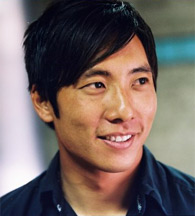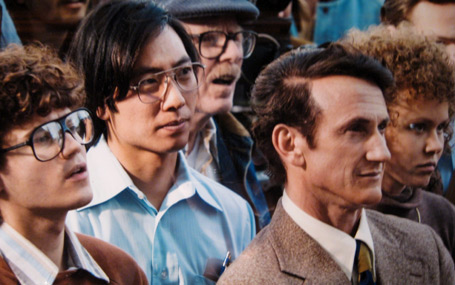Watching the premiere of Gus Van Sant's Milk in Singapore, I was pretty surprised to see an Asian face among all those white actors who portrayed the gay activist community of 1970's San Francisco. It turns out that one of Harvey Milk's closest political advisors was an Asian American activist named Michael Wong - a straight man who wanted to build political alliances between the gay community of Castro Street and the Asian community of Chinatown.
Wong isn't a major character in the film, which is a shame, given his importance in Milk's campaign and administration over the five years they worked together. As you'll see in the movie, their relationship wasn't always harmonious - he was nicknamed "lotus blossom" by his colleagues and jokingly told that he should be doing the laundry instead of working on the direct mailers. He also had a major fight with Milk when the interests of Asian American and gay rights clashed, though fortunately they made up just before Milk was assassinated.
Today, Wong is still both alive and working in activism, and has even been quoted in a recent interview saying he believes Milk would've become mayor of San Francisco had he survived - his political talents were that great. Van Sant's film, as well as other books and documentaries about Milk have relied on interviews with him as well as his detailed and intimate diaries of the period.
I wasn't able to interview Wong himself, but I did get hold of Kelvin Yu, the Taiwanese-American actor who plays him (a.k.a. the hot token Asian guy in the TV series Popular, a.k.a. the hot token Asian guy in Cloverfield).
Yu's already been involved in a minor controversy regarding the casting for the film: van Sant's first casting call described the character of Michael Wong as "fiercely intelligent (a nerd, even) and asexual." That blurb pissed off a lot of Asian Americans, including Wong himself - and it didn't help when the second casting call described the character as "the ultimate dork."
Fortunately, the very handsome Yu was unable to play into these stereotypes, and appears with some dignity in the show - and though he doesn't speak that many lines, he does get a decent amount of screen time. We at Fridae managed to pin him down for a few questions about what he calls the most important film he's ever worked on. Oh yeah, and before you ask: sorry guys, he's straight.)

Kelvin: I am 30 years old and I live in Los Angeles, California.
æ: Tell us about the audition process for Milk. I read about the protests over the racial stereotyping of the role of Michael Wong in the two casting calls - now I'd like to hear your side of the story.
Kelvin: I went in fairly early in the process and they were looking for something very specific. Gus Van Sant (our director) had, in fact, mostly wanted to cast a non-actor, as he often does in his films. When that idea garnered no returns, they began seeing actors, but I was far from their first choice - mostly because I don't physically resemble Michael Wong at all. Ultimately, it came down to the acting and I got the job, but it was a process.
In regards to the racial stereotyping, I think that Asians have every right to be offended by Hollywood's tendency to put people in boxes, to simplify characters and perhaps propagate some racial prejudices. That's a valid point and I'm not defending anyone in film and television - but I would remind people that EVERYONE in a movie is a stereotype to some extent. That's the untenable position in which writers are often put at times: to tell a story with well-defined characters while simultaneously doing justice to a larger reality out in the world. It's too bad when a character has to be angry and Black or, say, bookish and Asian - but I don't necessarily think that means the film is making a statement about the population at large. It's tough to say.
æ: How did you react when you found out you got the role? Were there any concerns about the fact that you'd be playing a gay role?
Kelvin: Firstly, I'll say that I was thrilled. Sean Penn is an iconic actor, Gus is one in a handful of great directors working today who can straddle that line between commercial and avant garde film, and Harvey Milk is an incredible story which is not only true, it is inspiring, timely, and unbelievably dramatic. So yes, that was a thrill. I was thrilled!
Secondly, it's an easy mistake to make, but Michael Wong is not and never has been gay. I think that makes his character even more interesting. Here's a Chinese-American man in his early to mid-20s in San Francisco, who formed a coalition with the gay community over issues that bridged sexual orientation and spoke to the larger point which was civil liberty and progressivism and hope. The movie is, in actuality, a love letter to the American democracy couched in the story of the Gay Movement, but I think it's important for people to see this movie as bigger than just gay. It's about freedom. Michael being straight only adds dimensions to that in my eyes. And no - I had no concerns about playing the role.
æ: I heard you got to meet Michael Wong - what was that like?
Kelvin: I can honestly say that Michael is a good friend of mine now. So many of the other characters in Harvey's life - Jim Rivaldo, Scott Smith - have passed away (many a victim of the AIDS epidemic in the 1980s), but Michael is still around still full of energy.
On top of that privilege, Michael kept a political journal which recounts in shockingly meticulous detail every event of the 1960s and 70s. It is a resource that no actor would even dream of. It's all in there, and Dustin Lance Black, our writer, even used it at times. So thanks to that, I had an enormous tool right at my fingertips. There have also been several great books written about that time period. I encourage everyone to read Randy Shilts The Mayor of Castro Street: The Life and Times of Harvey Milk. It's a moving, important, fascinating book about a really brave man.
æ: What was it like working onsite with Gus van Sant and Sean Penn?
Kelvin: Gus is an interesting director. I think directors can often affect their sets the way parents affect their children. By that, I mean that it's not always just about what you're saying, so much as it is about how you are and who you are. People pick up that energy and Gus has such a relaxed demeanor and he's so poised and zen-like, it definitely found its way into everyone else's personalities. I've never been on a more relaxed set. He's also a man of very, very, very few words, which can be nerve-wracking at times.
Sean Penn is equally a master, but very different. If anyone out there ever wondered, Sean's intensity is not an act. He is easily the most intense person I've been around. All I can say is that I was truly blessed to watch these guys at work. I will never forget it.
æ: Tell us a bit about the gala premiere.
Kelvin: We premiered the picture in San Francisco at the Castro Theater which is directly across the street from the camera shop where Harvey Milk devised all of his political ambitions. It was truly a full circle - especially because it was almost 30 years to the day since his assassination.
Even more, we premiered it one week before the California State vote to repeal Gay Marriage, so the climate was palpable and the relevance of the film was apparent. The afterparty was in the San Francisco City Hall, an amazing building, and everyone had a great time. That premiere was much more a celebration of Harvey than of any movie or any star. It was special.
æ: How did you get into film acting?
Kelvin: I've acted in theater since I was about 13 years old. When I went to college at UCLA, I studied acting there and eventually decided to pursue television. That began around the age of 19 and it's carried on since. I wish this story was more interesting, and it involved somebody "discovering" me at the local pizza shop. But it's not that entertaining - I just always wanted to be an actor.
æ: I've heard you do some other creative work too?
Kelvin: I am currently writing with some other friends here in Los Angeles. We are writing a television show together. It's gratifying because you can wake up and just do it. You don't need to call a crew together and load a camera. It's much more empowering at times, in its own way.
æ: Have you been involved in activism yourself?
Kelvin: I was involved with some groups in Latin America regarding political corruption and third world poverty. That's something I've been interested in from a younger age. As far as gay rights activism, the film has provided me some opportunities to make a statement, but the passing of Prop 8 was definitely a setback. I think the tradition of this country is a progressive movement towards greater civil liberty, so it's inevitable that this will happen sooner than later. That being said, it's everyone's duty to be heard and create that momentum that will ultimately get things changed. I think we're in a good place right now nationally with Obama and everyone sensing an accelerated pace. I hope it can translate to Gay Marriage in the next few months or years.
æ: What's been your most satisfying role, other than that of Michael Wong?
Kelvin: Other than Michael Wong, I would say that working on Studio 60 On The Sunset Strip was a really wonderful experience. I only did a few episodes, but the cast and creative team involved with that project were top rate. I was spinning in circles from all the talent surrounding me - some of the best TV writers and actors around. I was thrilled to get that job.
æ: Who are your inspirations?
Kelvin: I've said this before... and it's weird. But my two biggest inspirations on a daily level are probably my brother [Charles Yu] and Tiger Woods. Ha!
I just think my brother is best, most decent person I know. He's also a great writer (his first book is a collection of short stories called Third Class Superhero). As for Tiger Woods, I just marvel at his mental focus and his drive really. He has a supernatural ability to perform under pressure. It's something I think about for some reason. I also really love Bob Dylan, Philip Roth, and Jeff Bridges.
æ: What other projects are you doing next?
Kelvin: I recently worked on CSI: NY as some kind of serial killer. Before that, I was recurring on a show called Dirty Sex Money, but we just got canceled. The industry is threatening to halt due to an actor's strike, so for now, writing this television show is going to carry me through 2009 creatively.
æ: What's your great ambition?
Kelvin: That's a great question. I think my great ambition is to affect somebody in a positive way, to be part of a movement for positive change. That is happening on a lot of levels these days and doing this film, Milk, was the first time my acting was directly linked to something that felt important in a grand sense. I am seriously grateful for Harvey Milk and so appreciative I got to help tell his story.

